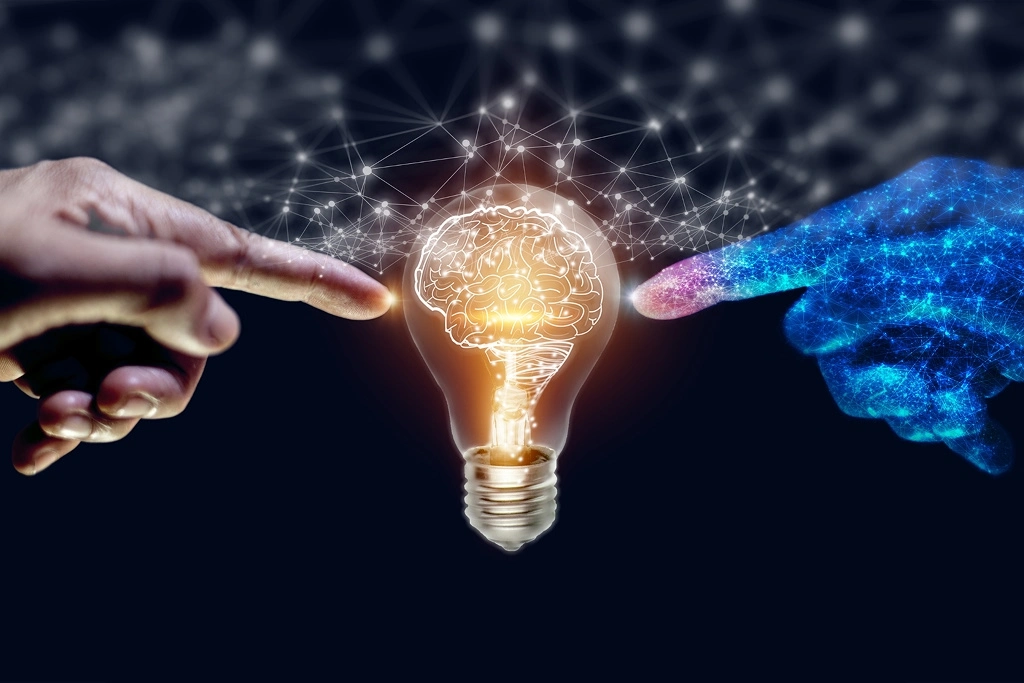
How AI Is Changing Skills in Digital Marketing
The skills needed in digital marketing are evolving rapidly. With the rise of AI-powered tools and platforms, the ability to adapt, learn, and lead with strategy has never been more critical for digital marketers. From generative AI that can create content in seconds to platforms that analyze consumer behavior across multiple channels, artificial intelligence is no longer a novelty, but the new normal.
While AI automates repetitive tasks, it also places greater value on human creativity, strategy, and data-driven thinking. In this blog, we’ll break down the digital marketing upskilling approach you’ll need to thrive today, how AI is shaping the field, and what companies should look for when hiring web developers, digital marketing gurus and creatives in 2025 and beyond.
The Core Digital Marketing Skills Still Matter
The foundation of marketing hasn’t changed, despite the AI buzz and AI powered marketing copy and content setting the internet ablaze in recent years. You and your marketing team still need a deep understanding of your target audience, a strong brand voice, and the ability to generate leads through compelling marketing content. What’s changed is how we do it and how fast we’re expected to deliver results.
Here are the timeless digital marketing skills that remain crucial:
- Content Marketing: Knowing how to tell stories that resonate, even if AI helps you with the draft.
- Search Engine Optimization (SEO): Understanding how search engines work, how to do keyword research, and how to optimize landing pages and web pages.
- Email Marketing: Creating email campaigns that convert while using marketing automation to scale outreach.
- Social Media Marketing: Using social platforms to boost audience engagement, build trust, and track sentiment analysis in real time.
- Data Analytics: Leveraging tools like Google Analytics to extract valuable insights and adjust your marketing strategy based on performance.
- User Interface Awareness: Designing digital experiences that are intuitive and optimized for conversion.
These foundational abilities help ensure your team’s digital presence is strong, targeted, and aligned with your business and career goals!
How AI Is Reshaping Content and Digital Marketing Strategies
AI-powered content tools aren’t just speeding up delivery—they’re transforming the entire content lifecycle. For today’s marketers, understanding how to integrate AI-powered marketing copy and content into your workflow is just as important as knowing your audience.
Content Drafting and Testing
Instead of starting from scratch, teams are using generative AI to draft everything from blog intros to email marketing campaigns, freeing up time to focus on higher-level strategy. AI also allows marketers to test content across multiple channels (from social to landing pages) faster than ever before. A message that once took weeks to test and optimize across social media platforms, web, and email can now be refined in real time.
Where Human Marketers Stand
Still, speed means nothing without strategy and the right humans behind it. AI might create 10 headlines in seconds, but only a human can determine which headline aligns with your brand voice, resonates with your target audience, and supports your campaign’s conversion rate optimization goals. AI can also miss the mark entirely (as it often needs to be trained) and to the trained eye, businesses that rely solely on AI to create their content may stand out for the wrong reasons.
As a result, the marketer’s role isn’t obsolete, but shifting. We’re becoming content editors, curators, and data translators, ensuring that AI-generated output meets our brand’s standards and aligns with consumer intent. This includes optimizing content through tools like Surfer SEO, managing assets in content management systems, and polishing drafts collaboratively in platforms like Google Docs.
Ultimately, AI is a co-pilot, not a replacement. It’s a tool, and it’s your job as a marketer to use it to guide the process, enhance what it produces, and keep your marketing authentic, relevant, and consistent.
What Skills Are Needed in Digital Marketing in the AI Era?
AI isn’t replacing marketers. Without human guidance, AI powered marketing solutions won’t solve anything. It can be suggested, however, that AI is transforming marketers.
To stay competitive, today’s digital marketing professionals must combine human insight with machine efficiency. That means expanding your skill set to include the following outlined below.
1. AI Literacy
You don’t need to be an engineer, but you do need to understand how AI marketing tools work. Know the difference between machine learning, generative AI, and AI-powered marketing solutions so you can use the right tool for the job.
2. Data Analysis
With more data available than ever, marketers must know how to interpret it. From conversion rate optimization to consumer behavior trends, being able to use platforms like Google Analytics and Surfer SEO to inform decisions is non-negotiable.
3. Prompt Engineering and Content Editing
AI tools can now create captions, blog outlines, or full drafts, but they still need a human eye for nuance, voice, and accuracy. Understanding how to guide and prompt AI and edit outputs ensures your marketing campaigns maintain quality.
4. Strategic Thinking
AI can write, but it can’t plan. Knowing how to build a holistic marketing strategy across different platforms (from Google Ads to TikTok) that maps to the buyer journey is a uniquely human skill.
5. Adaptability and Learning Agility
The tech stack is constantly evolving. From AI tools to sales engagement platforms, marketers who embrace change, experiment with new software, and upskill regularly will stay ahead.

The Role of Emotional Intelligence in an AI World
Along with the skills listed above, high emotional human intelligence is vital when dealing with AI, and it’s one that only a human (like you) can bring to the table. In a world where algorithms can write copy, schedule posts, and analyze click-through rates, soft skills are becoming a marketer’s superpower.
Empathy, active listening, and emotional awareness are key to delivering campaigns that actually connect. While AI can analyze audience engagement metrics or run a sentiment analysis, it can’t truly understand what it means to make someone feel something. That’s where you (and/or your team) come in.
How Human EQ Impacts Marketing
Whether you’re building a campaign around a social cause or crafting messaging during a crisis, emotional intelligence helps ensure your marketing content is human-centered and data-driven. It’s also essential when navigating the buyer journey, especially when guiding customers through emotionally charged decisions, like choosing healthcare services or switching financial providers.
Emotional intelligence also plays a critical role in brand development and team collaboration. Strong marketers need to adapt their communication skills across departments, listen to feedback, and influence decision-makers without losing sight of the bigger picture.
Where EQ Matters Most in Using AI
As companies scale their use of AI and automation, EQ becomes a differentiator in crafting better content and leading teams, making hiring decisions, and fostering professional relationships built on trust and authenticity.
The future belongs to digital marketers who can balance logic with empathy; those who not only understand market trends, but human ones too.
AI-Powered Marketing Tools That Are Changing the Game
The rise of AI-powered marketing has introduced tools that automate, optimize, and even create. Some of the most widely adopted include:
- ChatGPT and Jasper for content generation and brainstorming
- Grammarly and Hemingway for content optimization
- Surfer SEO for SEO scoring and competitive research
- HubSpot and Mailchimp for email marketing campaigns and automation
- Canva’s AI tools for visual content
- Google’s AI integrations for Google Search and ads performance insights
These tools improve efficiency, enable more personalized messaging, and help marketers scale efforts across multiple channels. But using them effectively means knowing when to rely on automation and when to lean into human intuition, empathy, and creativity.
How to Upskill or Hire for Today’s Marketing Teams
As AI transforms workflows, companies must rethink who they hire and how they invest in current employees. Here’s how to attract and retain top-tier talent in an AI-first world.
1. Focus on Hybrid Skill Sets
Look for candidates who balance technical know-how with creative thinking. The best marketers of tomorrow will blend data fluency with storytelling and empathy.
2. Emphasize Continuous Learning
Provide access to courses in data analysis, AI marketing, and content creation. Encourage certifications in tools like Google Ads or HubSpot. Bonus points for employees who actively explore free tools (even the free versions) before the company adopts them.
3. Highlight Culture and Purpose
Top talent wants more than tasks, they want meaning. Connect brand development and content marketing to real-world impact, and empower your team to build loyalty with both existing and new customers.
4. Rethink Job Descriptions
Instead of listing rigid requirements, ask what someone can learn on the job. With the right support and mindset, employees can go from rookie to expert users in months.

Source: Shutterstock
AI + Human Creativity = A Smarter Future
The future of digital marketing isn’t human or AI, it’s both! While AI-powered marketing may handle the heavy lifting of analysis, testing, or generating initial drafts, it’s human marketers who bring strategy, voice, and originality to life—aspects that truly drive business results.
As Harvard Business Review points out, organizations that integrate AI with human skills, rather than viewing them in opposition, will gain a competitive edge and build more adaptive, innovative teams.
AI Marketing Ethics & Data Responsibility
As AI-powered marketing solutions become more embedded in everyday workflows, marketers face a new set of responsibilities: how to use AI ethically and manage customer data transparently.
Affecting Authenticity and Transparency
Consumers are increasingly aware when AI is involved, and they care. Whether you’re publishing AI-assisted blog content or personalizing email campaigns, transparency matters. Disclosing when AI was used to create content or customize messaging can help preserve authenticity and avoid misleading your customer base.
Marketer’s Ethical Responsibility
Data privacy is another critical area. Access to vast amounts of customer data (from browsing history to purchasing behavior) requires stricter ethical standards.
As marketers, we’re not only responsible for driving sales, but also for protecting the people behind the metrics. That means using data analytics tools responsibly, securing opt-ins for data use, and being crystal clear about how data feeds into marketing automation systems or sales engagement platforms.
Note: It’s worth considering the potential biases in AI models. Just because an algorithm suggests a campaign direction doesn’t mean it’s the most inclusive or effective choice.
Why Conscientious AI-Use Matters
Marketers must review AI-generated outputs for fairness, tone, and cultural sensitivity, especially when targeting diverse or global audiences. Companies that lead with transparency and values will stand out in an increasingly AI-skeptical market. Ethical AI use isn’t just about compliance—it’s about building customer loyalty, long-term trust, and a more sustainable digital presence.
AI-Powered Marketing: Skills That Set You Apart
As artificial intelligence becomes more deeply embedded in our work, the skills needed in digital marketing are expanding and becoming more interdisciplinary than ever. Today’s marketers need to be analytical and empathetic, strategic and adaptable, digitally savvy and creatively bold.
In this new landscape, those who embrace AI-powered marketing while continuing to sharpen their core strengths—communication, curiosity, storytelling, and strategy—will not only survive the shift, but will lead it.
Because no matter how smart the tech gets, it’s still humans who create content that connects, builds customer loyalty, and inspires action.
Charge Into AI-Powered Future with Expert Employees
Are you looking to create your dream AI-powered marketing team? At Ad Culture, we specialize in connecting the best talent with the right businesses.
Whether you’re seeking marketing managers, data analysts, or web designers, we’ll help you source AI-forward talent who can launch your company to the next level. Contact us today to learn how we can help you build a thriving team.








